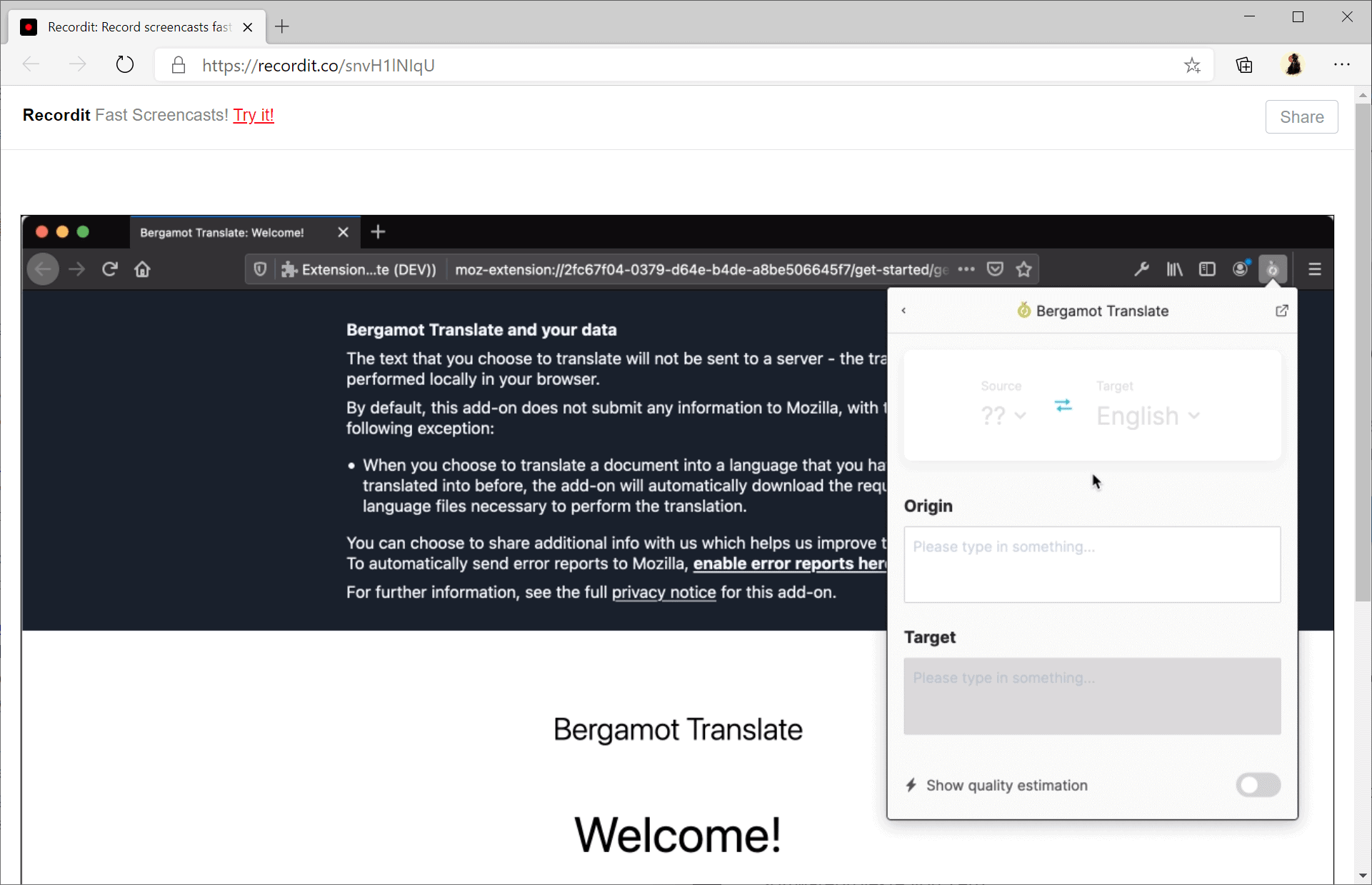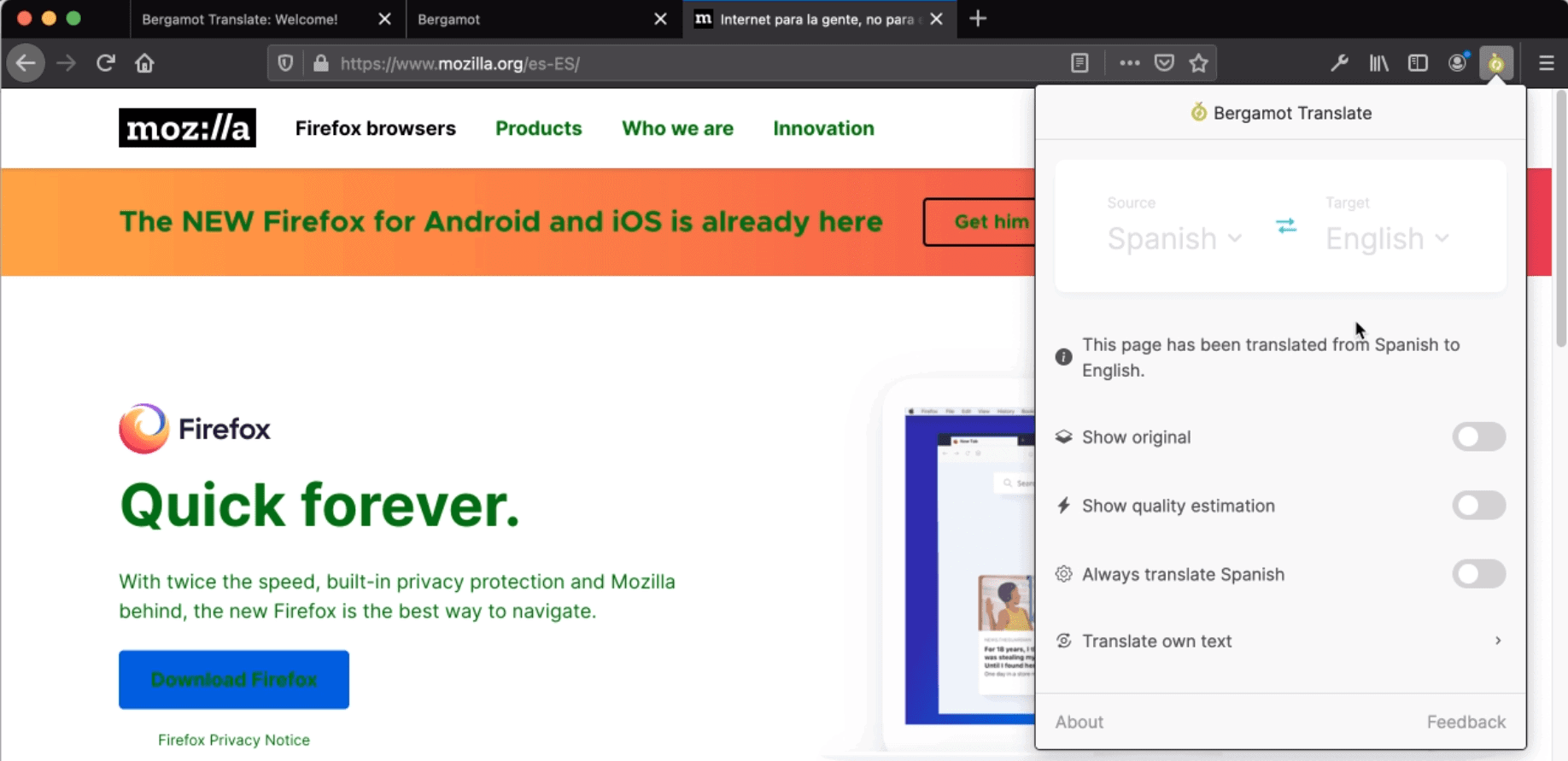What is the status of Firefox's client-side translation feature?

Work on a project called Bergamot started in 2019 to develop client-side translation in a web browser. The project, run by several European universities and Mozilla, aims to create a translation service that preserves privacy for home users and the public sector alike.
Mozilla, maker of the Firefox web browser, ships the browser without translation functionality. While it did work on various translation features in Firefox in the past, none made it in the stable version of the browser, or at least not in enabled state.
Firefox users may install browser extensions like To Google Translate or Translate Man to add translation functionality to the browser. The big issue with these extensions is that they rely on third-party services, often by Google, Microsoft, Yandex and other companies. All of these translation services require connections to company servers, and that is a problem from a privacy point of view.

Project Bergamot aims to change that by running the translation engine locally and not in the cloud. The project team released a short demonstration video in 2019 that showed the first basic version of client-side translation running in the Firefox web browser.
Another interesting feature of Project Bergamot is that you may enable a quality estimation. The extension color-codes the text to estimate the quality of the translation; for example, green text indicates high quality.

Last month, another video has been published on the project team's official Twitter channel. The team demonstrates two different forms of translation in the demonstration: translation of user input and translation of an entire website. Both translations happen on the local system without requirement to connect to a cloud service. In fact, the only time the extension contacts a server is when it needs to download the files necessary to translate a language that is not supported locally yet.
The speed of the translation is fast, and it is backed up by numbers. The team published translation performance data back in June 2020 for several devices. State of the art desktop PCs from 2019 manage to translate more than 8000 words per second using the machine translation service; the number goes down on older systems, e.g. a desktop from 2016 manages more than 6000 words per second and an iMac from 2012 more than 3000 words per second. Most websites should translate in under a second even on older systems.
Closing Words
The team has not announced a release date yet. Whether we will see a public preview of the Bergamot extension in 2021 is unknown at this point.
Now You: What is your take on Project Bergamot? (via Sören Hentzschel)






















Wow, finally a Mozilla initiative that is not user hostile crap !
Oh wait, it’s because it’s paid and developed by public european universities.
Well, let’s at least thank them for not rejecting a gratis and positive contribution to Firefox this time, even that is not common from Mozilla. Assuming it will actually be a reality some day, it has been a long time already we’ve been waiting.
Maybe Firefox should get more funding/contributions of that type, it appears to be the only thing that gives positive results there.
So if private client side translation is possible, we should start to question every “cloud” service provided by Google, Apple, Amazon and the rest, like the smart assistant, that are in fact not local only so they can spy on us. The reason why they have a hard time existing are not technical, they are economic, monopolization, bribery and economic sabotage from surveillance capitalists asphyxiating all superior and privacy respecting solutions.
Project Bergamot may be great for Firefox users; the idea in and of itself is unique, I assume. I use Translate Web Pages that was mentioned and find it more than adequate. Enough so to deliver a donation to the developer.
Reading comments on gHacks, however, tells me Project Bergamot will only affect “4%” of the browser based community because so many people absolutely “hate, despise and will never use” Firefox.
For whatever reason, convenience?, I continue using Firefox and only use Chrome when Firefox won’t render a page properly–probably due to extension issues. Opera and Waterfox are on the system, but I rarely rely on them. I do like Opera, though.
Sounds like a great idea . . . .
https://gs.statcounter.com/browser-market-share
Actually, FF is 8% on desktop and going up, along with Safari at 10%. Mobile’s kind of irrelevant since Chrome and Safari own it and have for years, no surprise there. Samsung Internet has been riding steadily at 10% for over a year. Everyone else is buried in the noise on mobile.
(yeah, I really wrote that for some reason…)
:)
I currently use the Translate Web Pages extension by Filipe Ps, it is one of the best extensions I have found in this regard. It is not necessary to open new pages for this and I can translate by clicking on the words, simple and functional.
https://addons.mozilla.org/en-US/firefox/addon/traduzir-paginas-web/
The main problem is not to translate (because yes we can already do it with extension) the main problem is the integration in the navigator.
I’m not a fan of chrome but I can admit that the translator engine is very good :
– It is dynamic : if you chat with telegram web, new messages are automatically translated
– It is smart : if you open the chinese interface of your local router you can still translate it (I mean it can translate local content)
So it is a good example 😛
They should work with Deepl.com which offer a very good translate results. OK it is a server but it is so better than google translate (and probably local engines).
Anyway looking forward to test this implementation !
From a translation quality point of view DeepL is not better than Google Translate and it’s still a cloud service with the same reasons to use it or not to use it. Also DeepL does not offer website translations at all so it’s not even an alternative to Google Translate.
We urgently need “a translation service that preserves privacy.” So let’s hope that Project Bergamot will succeed and that a browser extension will become available this year.